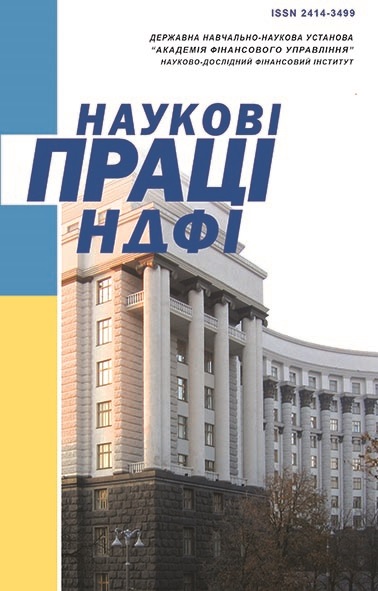
|
№ 1/2023
2. Ricardo, D. (1951). On the Principles of Political Economy and Taxation. (3rd Ed.). In Sraffa, P., & Dobb, M. H. 1821 from The Works and Correspondence of David Ricardo. Cambridge: Cambridge University Press. Retrieved from www.econlib.org/library/Ricardo/ricP.html. 3. Marx, K. (1989). Theories of Surplus Value. In Contained in the Collected Works of Karl Marx and Frederick Engels, vol. 32. New York: International Publishers. 4. Stamp, J. C. (1927). Industrial Fluctuations. By Arthur Cecil Pigou, professor of Political Economy in the University of Cambridge. (Macmillan & Co. Ltd. 1927. 397 p.). The Economic Journal, 37 (147), 418–424. doi.org/10.2307/2223555 5. Kuznets, S. S. (1955). Economic Growth and Income Inequalit. The American economic Review, XLV (1). Retrieved from assets.aeaweb.org/asset-server/files/9438.pdf. 6. Schumpeter, J. A. (1954). History of Economic Analysis. London: George Allen & Unwin. Retrieved from digamo.free.fr/schumphea.pdf. 7. Albrecht, J. (2002). Environmental Issue Entrepreneurship: A Schumpeterian Perspective. Futures, Vol. 34 (7), 649–661. doi.org/10.1016/S0016-3287(02)00006-X 8. Quinn, J. (1971, September – October). Next Big Industry: Environmental Improvement. Harvard Business Review, 120–131. 9. Berle, G. (1991). The Green Entrepreneur: Business Opportunities that Can Save the Earth and Make You Money. Liberty Hall Press. 10. Bennett, S. J. (1991). Ecopreneuring: The Complete Guide to Small Business Opportunities from the Environmental Revolution. New York: John Wiley. 11. Isaak, R. (1997). Globalization and Green Entrepreneurship. Greener Management International, 18 (18), 80–90. 12. Anderson, A. (1998). Cultivating the Garden of Eden: Environmental Entrepreneuring. Journal of Organizational Change Management, 11 (2), 135–144. doi.org/10.1108/09534819810212124 13. Keogh, P. D., & Polonsky, M. J. (1998). Environmental Commitment: A Basis for Environmental Entrepreneurship? Journal of Organizational Change Management, 11 (1), 38–49. Ddoi.org/10.1108/09534819810369563 14. Patakia, A. (1998). Grassroots Ecopreneurs: Change Agents for a Sustainable Society. Journal of Organizational Change Management, 11 (2), 157–173. doi.org/10.1108/09534819810212142 15. Schaltegger, S. (2002). Framework for Ecopreneurship: Leading Bioneers and Environmental Managers to Ecopreneurship. Greener Management International, 38, 45–58. Retrieved from www.jstor.org/stable/greemanainte.38.45. 16. Gibbs, D. (2006). Sustainability Entrepreneurs, Ecopreneurs and the Development of a Sustainable Economy. Greener Management International, 55, 63–78. Retrieved from www.researchgate.net/publication/263114808_Sustainability_Entrepreneurs_Ecopreneurs_and_the_Development_of_a_Sustainable_Economy. 17. Beveridge, R., & Guy, S. (2005). The Rise of the Eco-Preneur and the Messy World of Environmental Innovation. Local Environment, 10 (6), 665–676. doi.org/10.1080/13549830500321972 18. Dean, T. J., & McMullen, J. S. (2007). Toward a Theory of Sustainable Entrepreneurship: Reducing Environmental Degradation Through Entrepreneurial Action. Journal of Business Venturing, 22 (1), 50–76. doi.org/10.1080/13549830500321972 19. Schlange, L. E. (2009). Stakeholder Identification in Sustainability Entrepreneurship. Greener Management International, 55, 13–32. Retrieved from www.jstor.org/stable/greemanainte.55.13. 20. Parris, D. L., & McInnis-Bowers, C. (2014). Social Entrepreneurship Questioning the Status Quo: Waste as a Resource. Journal of Economic Issues, 48 (2), 359–365. doi.org/10.2753/JEI0021-3624480209 21. Kirkwood, J., & Walton, S. (2010). How Ecopreneurs’ Green Values Affect Their International Engagement in Supply Chain Management. Journal of International Entrepreneurship, 8, 200–217. doi.org/10.1007/s10843-010-0056-8 22. Kirkwood, J., & Walton, S. (2010). What Motivates Ecopreneurs to Start Businesses? International Journal of Entrepreneurial Behavior & Research, 16 (3), 204–228. doi.org/10.1108/13552551011042799 23. Kirkwood, J., & Walton, S. (2014). How Green is Green? Ecopreneurs Balancing Environmental Concerns and Business Goals. Australasian Journal of Environmental Management, 21 (1), 37–51. doi.org/10.1080/14486563.2014.880384 24. Lovinska, L., Oliynyk, Ya., & Kucheriava, M. (2020). Methodological approaches to assessing companies contribution to the implementation of SDGs and counteraction to COVID-19. Finance of Ukraine, 10, 47–63 [in Ukrainian]. doi.org/10.33763/finukr2020.10.047 25. Moore, J. (1996). The Death of Competition: Leadership and strategy in the age of business ecosystems. New York: Harper Business. 26. Erkko, A., & Llewellyn, T. (2014). Innovation ecosystems: implications for innovation management. In Dodgson, M., Gann, D. M., & Phillips, N. (Eds.). (2014). Oxford Handbook of Innovation Management, pp. 204–228. Oxford, UK: Oxford University Press. Retrieved from www.researchgate.net/publication/282122544_Innovation_Ecosystems_Implications_for_Innovation_Management. 27. Teece, D. J. (2017). Dynamic capabilities and (digital) platform lifecycles. Entrepreneurship, Innovation, and Platforms, Advances in Strategic Management, 37, 227–297. doi.org/10.1108/S0742-332220170000037008 28. Brown, R., Mason, C., & Mawson, S. (2014). Increasing “The Vital 6 Percent”: Designing Effective Public Policy to Support High Growth Firms. Nesta Working Paper, 14/01. Retrieved from www.academia.edu/16858150/Increasing_the_vital_6_per_cent_designing_effective_public_policy_to_support_high_growth_firms. 29. Doroshchuk, H. A. (2016). Management of organizational development: theoretical and conceptual foundations. Odesa: Bondarenko O. M. [in Ukrainian]. 30. Borysov, T. M., & Monastyrskyi, H. L. (2020). Institutional foundations and marketing imperatives of sustainable development. Ternopil: Ekonomicna dumka WUNU [in Ukrainian]. 31. Kupalova, H. I. (2011). Ecological entrepreneurship as an integral component of sustainable development of Ukraine. Bulletin of Taras Shevchenko National University of Kyiv. Military-special sciences, 26, 35–39 [in Ukrainian]. 32. Kovalev, A. I. (2006). Management of enterprise restructuring. Kyiv: AVRIO [in Russian]. 33. Oliynyk, Ya., & Kucheriava, M. (2019). Improvement of legislation for non-financial reporting in Ukraine as the result of cooperation with international institutions. Finance of Ukraine, 11, 31–43 [in Ukrainian]. doi.org/10.33763/finukr2019.11.031 34. Matos, P. (2020). ESG and Responsible Institutional Investing Around the World: A Critical Review. Lviv: Lviv Polytechnic Publishing House [in Ukrainian]. doi.org/10.2139/ssrn.3668998 35. Iefymenko, T., Lovinska, L., Oliynyk, Ya., & Kucheriava, M. (2020). Enterprise reporting on sustainable development in the context of the COVID-19 pandemic. Kyiv: SESE “The Academy of Financial Management”. Retrieved from afu.kiev.ua/getfile.php?page_id=1030&num=1 [in Ukrainian]. |
|
|
|
|
THE ACADEMY OF FINANCIAL MANAGEMENT |

|
|
|



